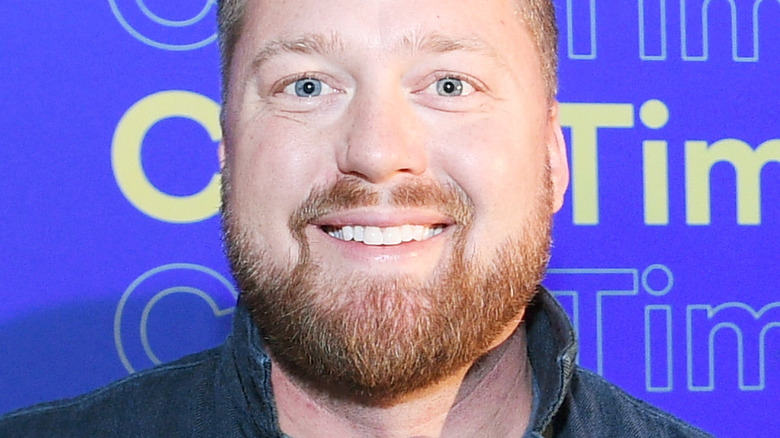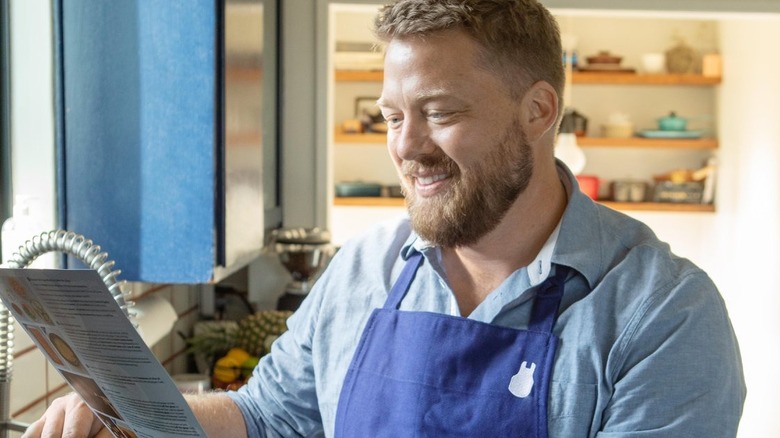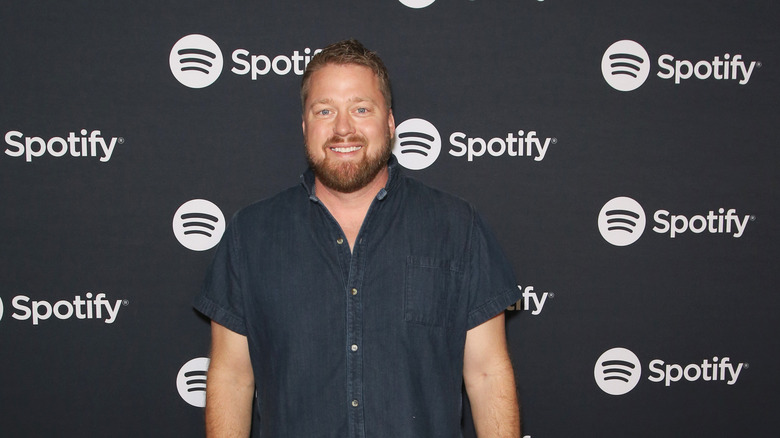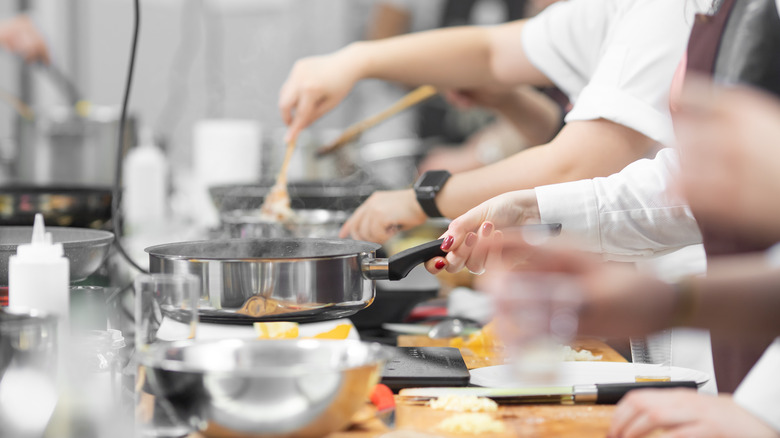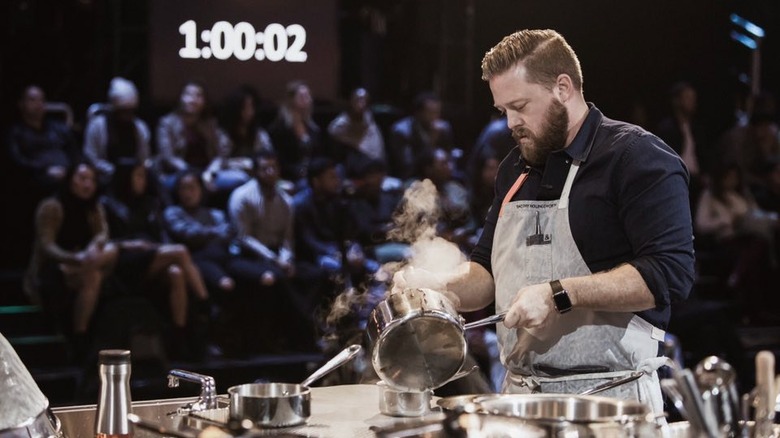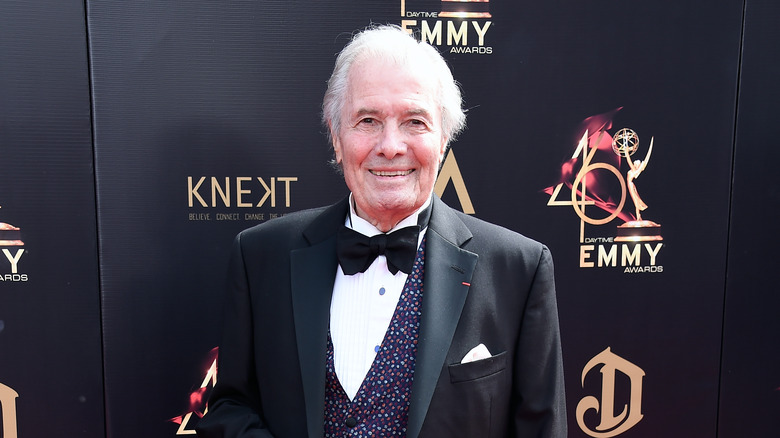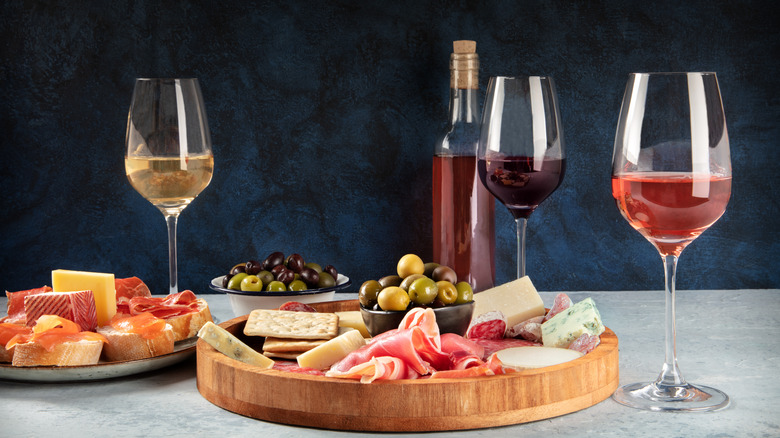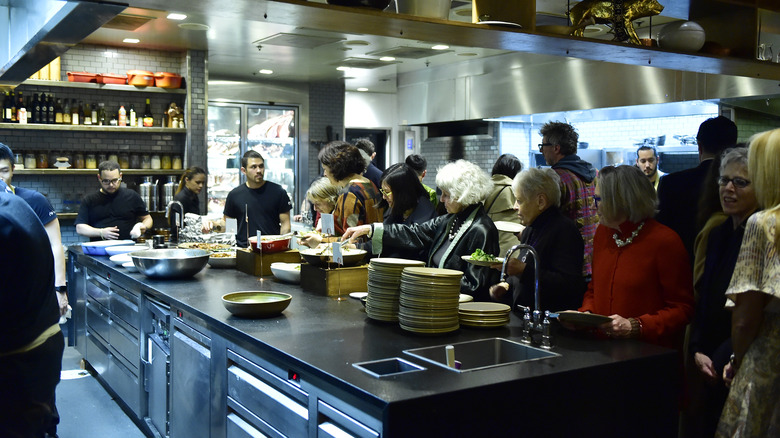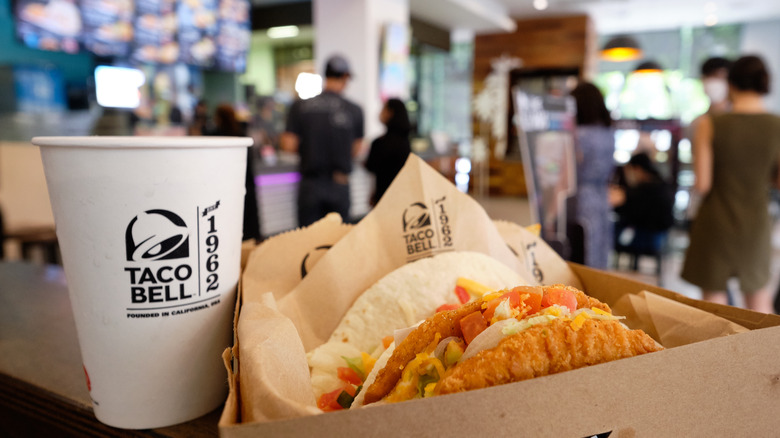Chef Tim Hollingsworth Talks Wine Pairing, Knife Work, And Keeping The Customer Happy - Exclusive Interview
Today, chef Tim Hollingsworth runs a celebrated and successful restaurant in one of America's most up and coming cultural centers. The locale is Downtown Los Angeles, and the restaurant is Otium, an upscale eatery nestled near the Museum of Contemporary Art, The Broad Museum, Walt Disney Concert Hall, and the Dorothy Chandler Pavilion, home of the Los Angeles Opera.
While Hollingsworth fits right into the cultural and culinary scene of his adoptive LA home, working with experts like Wine Insiders to plan wine pairings, designing award-winning dishes, and bringing to bear his cooking experience gained in restaurants America and across Europe, as a young man, he rarely thought much about food beyond the family dinner table, and he never considered a career in the kitchen.
During an exclusive interview with Mashed, Hollingsworth relayed how he grew up working in construction alongside his father and brothers. The father, sons, and their colleagues did everything from new builds to renovations of Blockbuster Video stores to running telecom cables. The soon-to-be chef was good at the work, but he decided to try his hand at something else. Around the time he turned 18, that something else was slated to be a military career, but fortunately for gastronomes everywhere, he happened to take a job washing dishes as a stopgap.
As it happened, Hollingsworth wouldn't be at the dishwashing station for long.
Growing up, it was more about the meal time than the food
Did food play a notable role in your life growing up? And if so, what was that role?
As a kid, honestly, I didn't really feel that food played that important role for me growing up, and it wasn't until I got older that I appreciated the way that I was raised and, how I was raised around food, and what that really meant to our family and still means to our family. And it's definitely something that I instill in my kids. But I grew up very humbly — I'm actually sitting in my parents' house now up in the mountains where I grew up. [As] I grew up, my mom cooked really every single meal that we ate. We ate out a very little bit growing up. It was really kind of a treat to eat out, but my mom was a very good cook.
She made chicken and dumplings and chili. Sundays, we had pot roast. A lot of Tex Mex-style food as well ... lots of different foods. My mom, she raised us on [home cooking], going to school and packing our school lunches — she packed my school lunch from as early as I can remember until I graduated high school. I went on to work at a French restaurant, and I learned French cuisine and French culture, how they spent time around the dinner table. [It was] very, very different than my family. Theirs was a lot more time around the dinner table, just longer periods of meals. They also had alcohol — we never had alcohol in our house growing up. It was pretty religious, the way we were raised.
As I got older, I took a look back and saw how I was raised and I attribute the closeness that my family has today and how close I am with my brothers and sisters, because dinner was the time where we all sat around as a family. Every single dinner we sat around, and we all had chores to do, whether it was cleaning up, or helping set the table, or help participating in making the food. I really believe that sort of connection is why we're so close today. I think there's a lot of families out there that don't necessarily spend that time around the table, and if they don't, hopefully they have another outlet where they spend a lot of time together, and they're forced to have conversations and talk about their day and stuff like that.
That's something that I pass on to my kids and my family, and we play what we call the Thankful Game. Sitting around the table, my daughter will be like, "Oh, can we play the Thankful Game?" Everybody says what they're thankful for, and I think just that time ... is very, very important, especially how busy our lives are these days.
How chef Tim Hollingsworth came to the culinary world
When did you realize, "Wait a minute, this isn't going to be just a job working in food, it's going to be a career."
Washing dishes was my first restaurant job. Before that, I did construction with my father from a very young age, [around sixth grade], and we would go and remodel houses on the weekend, and then eventually I worked for the company and we did a lot of hiding cellular towers, remodeling Blockbuster Videos, running telecommunication cables, all that kind of stuff. My first job in the restaurant world, I was a dishwasher. I moved up fairly quickly, and I was at my 18th birthday, so it was at a time in my life I was really at the point of, "OK, what am I doing for a career? What am I going to do for a job?"
I was about to join the Marine Corps. I wanted to do reconnaissance and all that, and then I was also looking into some other jobs but eventually I decided to stay in the restaurant industry. I took French at a community college, and I really started reading about French cooking and the history behind cooking. I really fell in love with the physicality of cooking and the rush of working on the line, and working many different things at once was kind of like a sport to me — very much an athletic type of vibe, and then the idea of being able to make something for somebody over and over again and get instant gratification, and if I didn't make it correctly, I had the chance to make it again correctly the next time. That sort of repetition I really fell in love with.
When I was [19 or 20] years old, I said, "This is what I want to do for a career." I ended up flying myself out to New York City, spending a week at the Culinary Institute up in Hyde park, coming back down and being like: "OK, this isn't something I feel like I need to go to school for. I'm going to just go and surround myself with the best and work for the best." So I was like, "OK, I'm going to get a job at The French Laundry." Being young and naïve, I thought that was possible, and ultimately I called and finally was able to get a job there, and I worked my way from the bottom to the top there.
That whole period was something that I really enjoyed, but it was really the restaurant that was before that, working with Christian and Jennifer Moss. The wife did the pastries and ran the front of the house, the father was the chef of the restaurant, and they really took me under their wings, and it was a lot of one-on-one time with the chef there. He would tell me about traveling to Scotland and working in France, England, New York, and all of these major cities, and this idea that I would have the ability to travel if I learned this craft was something that really drew me towards cooking, being able to experience the world through food. Ironically, that's still a huge passion of mine — learning about different cultures through cuisine and tradition, is something that I absolutely love.
Tim Hollingsworth's advice for the aspiring chef
What advice would you give to someone who wants to be a professional chef?
If you have the opportunity to go to school, it's a great thing. If I had to do it all over again, I'd probably go to business school. That was something hard, that [part of] learning the craft [and] the trade. I grew up doing construction, my dad did construction his whole life, my brothers do construction. I understand what it's like to work with your hands and build things out with your hands, and I think food is very, very similar to that in the sense that it's this like blue collar job that you're working in a lot of hours, you're cooking, and ultimately it's a craft. It's like you're honing your knife skills, butcher skills, cooking skills, and your technique.
I think [all that] can be done in the restaurant, so if a person didn't have the money to go to school, I think cooking is a great opportunity that you could either choose the path of a culinary school or not choose that path. The advice that I would offer ... when information is so much more readily available [now], like the internet ... is take [your time]. I think people progress really fast and want to grow really fast and they take management jobs and they kind of grow [because] the industry is short-staffed. [Make] sure that you hone your fundamentals, because those fundamentals are going to be something that carry you through the remainder of your career.
It's very difficult to be a prep cook, and then be a line cook, and then be a sous chef, and then be a chef and then go back to being a line cook. If you haven't spent that time putting in your repetition on your job, one day you're going to realize that you're behind a lot of other people that did take that opportunity while they were young to really hone those skills and practice those skills. Me, I spent a lot of time working in a restaurant. I would work 14, 16 hours.
When I'd go home or on my weekend, I was still practicing my knife skills. I was still practicing cooking and different techniques. I would go and buy mushrooms from the store and learn how to flute them, learn how to turn carrots, learn how to do all of these different knife skills and stuff like that are a little bit lost these days. I think spending that time and doing those jobs really built a solid foundation, so making sure that you build a solid foundation is key for the remainder of your career.
Tim Hollingsworth's advice for the home cook
What is advice you have for home cooks who want to take their cooking up a notch?
I think figuring out a specific dish that you want to learn how to make, and making it with repetition ... you only get good at something doing it over and over again, so you need to build up a repertoire of dishes that you know how to make in order to be able to build off of that foundation that you have. For instance, a roasted chicken is I something I think everybody should know how to make. It's a very easy thing to do, but it's an intimidating thing to do. Is the chicken going to be cooked enough, or is it overcooked and dry? How do I carve a chicken off the bone? Do I sear the chicken first? ... All of those different things.
I think that just taking the fundamental techniques of a roasted chicken with potatoes, carrots and onion, or a pot roast or something like that, and being able to cook it and setting a goal of, "I'm going to make roast chicken every week. Every Sunday we're going to do roasted chicken." Pretty soon, your roasted chicken becomes something that you feel very, very comfortable with. Now you have all of the skill set and all of the techniques that you did with that roasted chicken, and now you move on to the next dish. You still make roasted chicken, but maybe you're going to dive into a different sector and start cooking another style of the dish. A lot of the techniques that you used in that roasted chicken could be applied to the new dishes that you're making.
And are there common mistakes that you find casual chefs make?
I think not focusing on core flavor components like salt and pepper, so basic seasoning. We're not talking about spices or herbs or anything like that, just like basic seasoning I think is something to get down. Making sure your food has acid in it. If you roasted a chicken and you didn't have enough salt and pepper on it, and you didn't squeeze any lemon juice on it, then your chicken's going to be very plain and it's probably not going to be that great. But if you took that roasted chicken and you cooked it in a pan, and you had lemons that you cut in half, and you had herbs that you stuffed up the cavity with some garlic, some thyme, put some potatoes in the bottom of the thing, some carrots, some garlic that you would eat, not just in the cavity, and you season your bird liberally with salt and pepper, because you understand that the salt is not going to penetrate to the inside of the bird — you're only really seasoning the outside layer, unless you brined it, unless you dry brined it, or unless you injected it.
If I'm making a steak, I don't normally put a lot of rubs or spices on it. I want the quality of the meat with some good quality salt, some good quality pepper, some finishing salt, and a little bit of lemon juice at the end, and I think that's a really basic way to cook, but also a very, very delicious way to cook. And [make sure your foods] are clean, that you're working with the right products, like making sure you're spending the money on and getting quality ingredients. If you picked up a chicken from your normal grocery store, sometimes they're not the best quality, so maybe you need to go to a specialty market for those types of things. Choose when you want to spend the money to do something that's a little bit more special.
Tim Hollingsworth talks cooking on camera
What are some of the challenges and the surprises that come with cooking on camera?
I think it depends on the format in which you're cooking. If it just has to do with the actual cooking on camera ... for me, it's not really a challenge, it's kind of fun, and of course you're in a time constraint. Usually you have people asking you questions, so those types of things can add pressure, or be a little bit disruptive or throw you off course a little bit if you have to answer questions on the spot. As a chef that's cooked in a restaurant, and a chef that's taught a ton of people how to cook ... you find yourself that hopefully you're very comfortable explaining what you're doing and talking about what you're doing, because you know what you're doing.
When I cooked on, say, "The Final Table," the cooking was the fun part and the easy part. It was a time constraint and you had to run and you had to figure out what you can get accomplished in a certain amount of time. [Cooking's] something that I do every day, so I wouldn't say it's really a challenge. I think that the challenging part of that is dealing with the pressures.
Is there a specific standout moment for you that was the most fun you've had cooking on TV?
There's a specific feeling that I get, and it's one of the real reasons where when I started cooking I fell in love and carried on with what I was doing. You get into this flow, or this dance is what we call it in the kitchen, in the industry — it's this feeling that you're working so many different things, you have pots and stuff on the stove, you have stuff in the oven, you have knife work, you have to plate your food, all this stuff that you're doing in the moment. Yes, you're thinking, and you're focused on what you're doing at the moment, but you get this out of body experience where you're flowing from one job to the next, and you're not even really thinking.
It's like all just innate, and it's in your mind. I would equate it to being like a running back and you're getting the ball and you have to see what lane to go down in order to get past all the guys. And it's that same sort of feeling, I would imagine — I played football growing up. Same sort of feeling is just the idea that you're just kind of going through these motions in this rush, and you're moving so fast and you're getting a lot of stuff accomplished, but you're not really [going] to sit and think about what you're doing, it's just this natural thing and this flow that you experience.
That dance, even like when you're working next to somebody, and you work next to somebody for a little bit of time, you know their moves, they know your moves, and you can cross paths and go on their stove and they can go on yours, and you're moving all around and you're not getting in each other's way because you guys are both in this flow. And I think I love the feeling of being in that flow. I think it's just such a cool feeling.
The chefs chef Hollingsworth admires
Who is a celebrity chef you'd love to work with?
I mean, there's a few. When I think about it, I'd love to work with Jacques Pépin. I have a lot of respect for Jacques Pépin. I think he's really an old school guy, he's been around for a long time. He's got a lot of really, really cool techniques. I really respect what he's been able to do. He's definitely one, and I think about maybe the newer style celebrity chefs. I don't know, I've had a lot of experience working with a lot of different chefs, so it's hard to pick one maybe that I haven't worked with that I really want to work with, but I think Jacques Pépin is a good answer. I think Jacques Pépin, or even like a Julia Child. Those people that just have that old school traditional technique, and really appealing to the home cook too. I think that they've done a really great job showcasing really great dishes, really classic dishes, and helping that be applied to home cooks.
Who is a chef you'd love to have cook you a meal?
Alain Chapel would be the person that I would want to cook for me. He's a famous chef from the '70s, and his philosophy and what he meant, and all that kind of the history behind that food, and that food of that era is something that I studied a lot, and really appreciate and am drawn to, so I would love to go back in time and eat a meal at his restaurant.
Tim Hollingsworth talks wine pairing
What do people tend to get wrong when planning wine pairings, and what are tips for getting wine pairing right?
I think that people hone in too much on wine pairings, and understanding that: "Oh, this specific wine is going to go with this, or white wine with fish, and red wine with meat." There's plenty of ways to cook fish and serve red wine. There's plenty of ways to cook meat that are more white wine friendly, especially poultry. And I think that people get intimidated and people get hung up, and I think that if I was to offer anybody advice, it'd just be is open it up and try it. Open it up and try it with what you're doing, and think about the flavor, think about what's reacting in their mouth, and think about why classic pairings are classic pairings. Why are you drinking Chablis with seafood? Why are you having a red wine with a steak, or a big Cabernet with a steak? And I think understanding, understanding what those do — you want somebody to just try to educate [themselves].
It's like you're trying to build up that repertoire and understand what you have and draw memory to specific flavor profiles that you get from different grape varietals of different regions. And for me, it's the same thing as that roasted chicken. It's like you want to create that roasted chicken dish, have it with Pinot noir. What do you think? Have a Grenache, what do you think? Maybe you're doing chicken with poached apricots, maybe you want to have it with a white wine now, and exploring how the flavor combinations work and why they work in specific ways, and being open to it, because what you are going to get from a glass of wine is going to be different from what I'm going to get from a glass of wine, based on our tastes and our smells and our experiences.
If I'm having a steak and that steak is rich and has a lot of flavor and I go and I open up a Cabernet with it, maybe it's a big, full body Cabernet from Napa. It's like: "Try that wine before you have a steak, and then try it when you have the steak." The wine before you have the steak is probably not going to be what the wine is going to be when you have the steak, because the steak actually helps carry the wine, and the wine helps you go back to the steak, and that's what wine really does for food for me. And when I think about food and pairings and creating dishes and all those things, I think about wine, and I think about what wine has taught me, and I apply that to food. And that's the balance that wine will bring to food.
When I'm creating a beautiful roasted steak ... I think that trying that wine with that steak, it has taught me what I want to serve with that steak. One of my favorite things to serve with that steak would be a bone marrow vinaigrette. This is a sauce we do, it's like a Bordelaise sauce ... we take that sauce, and that sauce is herbaceous, that sauce has pepper, that sauce has richness, but the sauce also has acid. It has lemon juice, it has red wine vinegar, those things that help bring the richness of the steak and balance it out with the acidity in the sauce and the herbaceousness in the sauce that helps you go from bite to bite, and you pair a glass of wine with that, and I think that's a match made in heaven.
The chef tells us all about Otium
What is a dish from Otium people simply have to try?
There's a definitely a few dishes. I think that the things is, you have to listen to your guests, you have to listen to what other people say, obviously, and the people rave about our potatoes, and they're pretty simple ... sort of steamed, and then we smash and then we fry, and then we season it ... And we pair it with like a confraction. It's like those potatoes are something that, for me, are a must-have if you're coming to Otium. It's a simple thing. It's very approachable. I think if you like fine dining food, or if you don't have a lot of experience of fine dining, the potatoes are going to be great, no matter what, no matter who you are.
We have our lamb neck, which is pretty incredible. It's a brazed lamb neck with a Trahana and Cuban tomato compote, and it's just [great] right now, this season, in the kind of cold. Having a dish that like that really warms your soul, I love that dish. And then we would focus a lot on our meats and our fish and the quality of them, so anything grilled off the wood fire hearth is going to be amazing. I like to rub [meats] with a sauce that we call our love sauce ... we kind of brush it with the sauce ... not trying to put too many ingredients on top of to mask the flavor of the ingredients, but something that just adds like a little element of depth and flavor.
Tell us about the name of the restaurant. Why did you choose it and what does it mean to you?
"Odium" is a Latin abstract term for something that you do in your leisure, eating, drinking wine, or academic endeavors. And it's really off of Mr. Broad's vision, is how we came up with the name. And his vision was the idea of getting people to walk around and making a community out of the area of Bunker Hill in Los Angeles. Bunker Hill has a tremendous amount of arts in that immediate area, there's a lot of business in that area, but if you walked around there seven years ago, it was hard to get a cup of coffee on a weekend. And so the idea was we wanted people to be walking around and hanging out on the plaza in front of the restaurant, and going to the museums and experiencing food and the culture in that area. I think that looking for names, it's difficult to choose a name. You want a name with meaning, but the name also has to roll off the tongue a little bit. It has to have this sound to it that flows and makes sense.
What are a couple of the secrets to running a successful restaurant?
I think culture and listening to your guests are two of the biggest things. When we opened up Otium, I had a vision, I had a very strong vision of who we are and what I wanted this to be. But at the same time, I didn't know Los Angeles the way that I do now, and I'm still learning about it, but I didn't know Los Angeles, I never opened a restaurant in Los Angeles, never really cooked in Los Angeles, so I didn't really know what people would be looking for. So the listening to the guests and what they came in [for], and what they had to offer as far as feedback on the menu, what types of food that they wanted to eat. Listening to that and understanding what people were looking for and what people wanted. And then culture is another part of it that is extremely important, and you spend a lot of time working with the people that you work with when you're in the restaurant industry, and I think making sure that you offer a positive environment where there's growth and there's teaching, and there's some sense of almost even like a family aspect of that restaurant, where people get to know each other and they support each other and they mentor each other.
Tim Hollingsworth talks Taco Bell, potatoes, and shredded coconut
Do you have any fast food guilty pleasures?
I don't eat a ton of fast food, to be very honest with you, but there's certain times. Obviously if I'm on a road trip or different things like that we will eat fast food. I just drove up to my parents' house, it's like an eight and a half hour drive, so we usually stop and eat once or twice. In-N-Out is definitely one of them that's kind of a staple one, especially being from California and living in California. In-N-Out offers great, reliable food ... I guess two other ones. I grew up on Round Table Pizza, that was something that my family would go and eat, so I like having Maui Zaui Round Table Pizza, or even Taco Bell. I love Taco Bell.
I always order the same things. It's Nachos BellGrande, two Tacos Supreme, and Cinnamon Twists, and it's one of those things that it's just nostalgic for me. I usually am not happy after I eat it, but looking forward to it and thinking about it is one of the things that it's definitely nostalgic for me.
Is there one single ingredient which you just couldn't live without?
Potatoes. I love potatoes.
Are there any foods that you just can't stand?
Anything with shredded coconut, I'll taste in two seconds, whether it be like Samoa cookies, the Girl Scout ones, or like German chocolate cake, any of those things, that's the one thing. I have never liked it, even since I was a kid. When I was a kid, I didn't like hot dogs and things like that. It's still not something that I have very often, but maybe like once a year I'll have a hot dog, and now I'll actually kind of get a craving for it every once in a while, that once a year hot dog, but it's like hot dogs were a thing that I never liked either, for whatever reason. If my family had them growing up, I would have the bun with ketchup on it.
What is your one single favorite dish to prepare?
I'll give you two answers. I really like cooking what people want to eat, because part of cooking for me is the satisfaction of making something for somebody else and seeing the reaction that I get from them. And so for me, If you said, "Oh man, I'm really craving fried chicken. I'm really craving this or that," whatever it is, I'm excited to make it because I know that you really want it. Doesn't really matter if I want it or not. And then other than that, it would go back to the roasted chicken or the steak. I make a steak and I cook it on top of a layer of potatoes that are layered with shallots and thyme and garlic, and they kind of cook down, and I have white wine garlic that I'll sauté and put it over the top of the steak. Put butter on that steak, sort of the juices from the steak, then the butter melts down, goes into those potatoes, they get a little crispy at the bottom, so the potatoes and steak for me, and whatever vegetable you want to have with it, that's one of my favorite things to have, or the roast chicken that we talked about earlier with the grilled lemon and potatoes. Another one of my favorites. Just simple and clean.
Is there a dish that you would just be happy to never make again?
I don't think so. I mean, I like cooking, and like I said, I like cooking for people, and so if somebody said that they really liked something, even if it was a German chocolate cake, I'd make it.
Find some great wines at Wine Insiders, follow Chef Hollingsworth on Instagram, and check out Otium next time you're in LA.
This interview has been edited for length and clarity.
